| HOME |
| Hotels |
| Apartments |
| Attractions |
| Restaurants |
| Tickets & tours shop |
| Tours |
| Maps & travel planners |
| Airports & transport |
| Maps |
| Events |
| Shopping |
| Contact us |
|
| Pictures Sitges Spain |
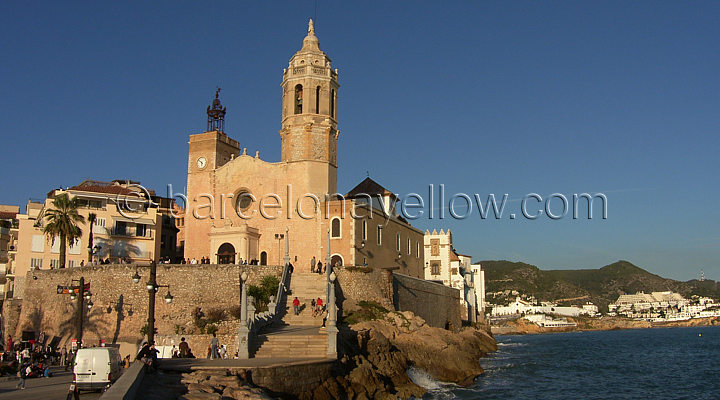 Pictures Sitges Spain near Barcelona. Pictures and photo gallery of charming village of Sitges near Barcelona in Spain on the Costa de Garraf. Sitges is perfect for a half-day or full day trip from Barcelona. For tourists the easiest option is to take the train from Barcelona train stations. It's a 35 minute scenic train ride, then a 15 walk from the station through the village to the beaches. Here are some photographcs of Sitges on the Mediterranean coast 35 kilometres southwest of Barcelona. Sitges has long been a fashionable place to live and visit and is much loved for its beautiful promenade, sandy and shallow beaches and quaint village centre with many boutiques and cafes. Sitges has been popular with artists since the late 19th century when renowned Spanish painter Santiago Rusiñol spent his summers there. In the 1960's Sitges became a centre for the 1960s counterculture of mainland Spain, which at the time was still ruled by dictator Francisco Franco. Sitges became known as "Mini Ibiza." The first Pacha nightclub in the world opened in Sitges in 1967 and is remains open to this day. How to get to Sitges from Barcelona Barcelona train stations The most famous Sitges landmark is the parish church "Església de Sant Bartomeu i Santa Tecla which is strategically placed on Plaça del Baluard - also known as La Punta, which means the point, in the oldest part of Sitges called La Vila Vella. The main church tower is called "Campanar de La Punta" which has a sculpture of the Virgin Mary - La Verge at the top. Walk down the Escala de La Punta stairway and you can see a bronze mermaid statue titled "Sirena de Pere Jou" by Catalan artist Pere Jou.  From the church you can see lovely views of the beaches of Sitges and the promenade Passeig de la Ribera. Behind the church are the oldest part of Sitges and the Cau Ferrat and Maricel museums. The semi-pedestrian area in front of the church is called Plaza de la Fragata or just La Fragata. La Fragata is also the name of one of the best restaurants in Sitges on the plaza. Many events take place on the plaza, including the Festa de la Verema - Sitges wine festival in October. 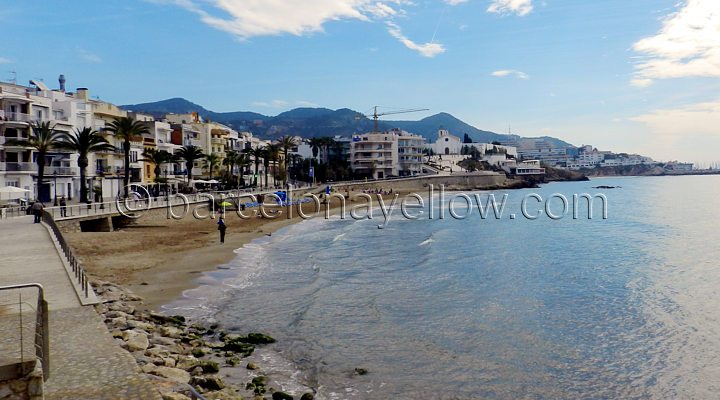 The beach Platja Sant Sebastià is behind the church towards Barcelona with Sant Sebastià cemetery is in the background. The beach by Sitges cemetery is called la playa de Balmins and is a popular surfing spot. In the cemetery you can find impressive modernist style tombs and pantheons of many rich Sitges “Americanos" or "Indianos,” which was the nickname for Catalans and Spaniards who returned to Spain with fortunes from Spanish colonies like Cuba and the Philippines after Spain lost these colonies in 1898 Not everyone came back from the Indies. The world's most famous rum brand Barcardi was founded by Don Facundo Bacardí Massó in Cuba in 1862. Bacardí was born in Sitges, but he never came back to live in Sitges. There is a monument to Bacardi on the beach promenade. Below view of sailing club on Platja de La Fragata 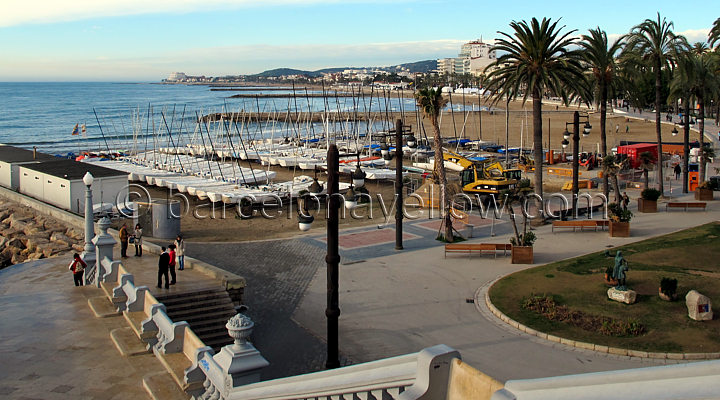 Vintage photographs of Sitges show same view in days gone by. 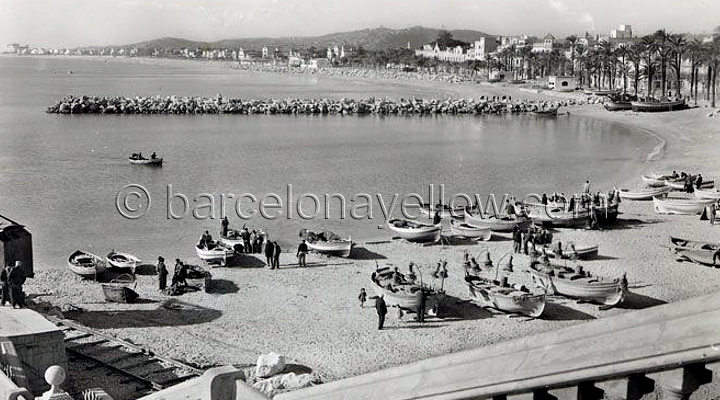 Old postcard of Sitges church and point taken before the sailing club was built. 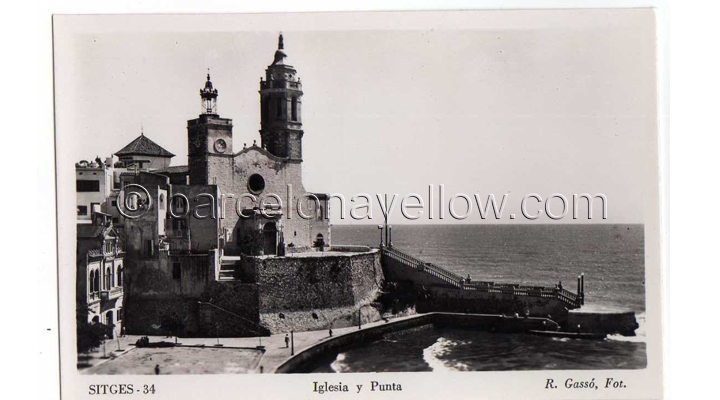 Canó del Baluard outside church on La Punta that saw action in 1797 against English pirate corsair galleons. The inscription by the canon reads: "History: This is one of the six battery guns of the Sitges bastion that on April 27th 1797 was in a long battle with two English frigates, who attempted to seize four merchant vessels anchored near the beach. After four hours of shelling the English ships withdrew in defeat unable to achieve their goal." 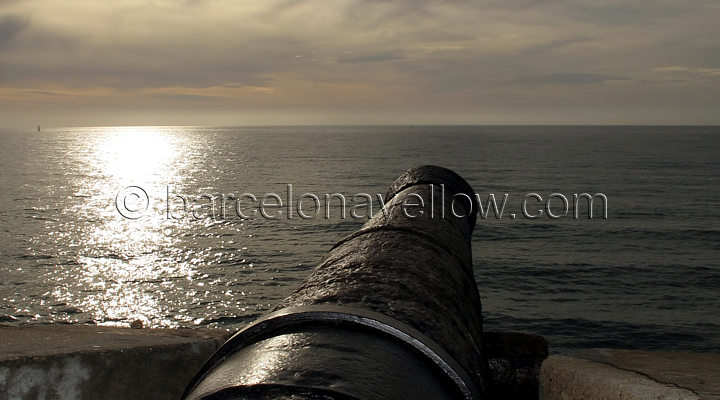 Palau Maricel de Terra houses the Museu Maricel de Mar which is temporarily closed for renovation. This gothic style building is from only from 1911 and was built on top of a much older chapel and some of the old arches were used on Palau Maricel. The Museu Maricel de Mar was formerly a purpose built art museum opened by millionaire American Charles Deering to house his art collection. In 1921 Deering went back to the U.S.A and took his art collection with him. The palace was empty for many years. In 1969 a new private collection of medieval art took its place. 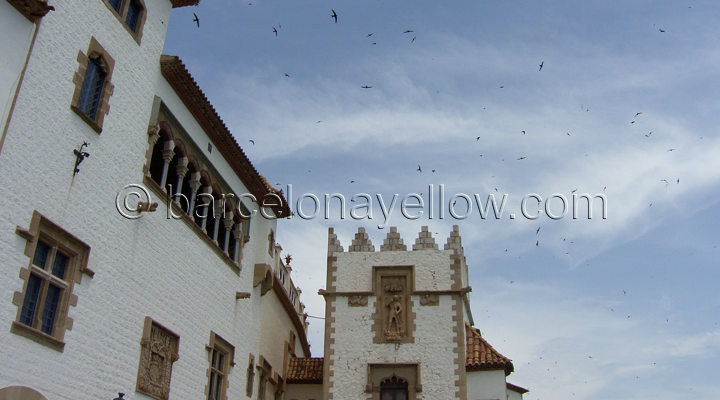 The little square in front of these museums is called Racó de la Calma, is one of Sitges' most charming places. Look out for the capitals at the top of the door columns sculpted by Catalan artist Pere Jou. Also of interest is the the Roman sarcophagus in the wall which was found in the 19th century near another church in Sitges - the Santuari Vinyet, the Sanctuary of our Lady of Vinyet. Next to the Palau Marical is the Cau Ferrat Museum, which was the house studio of artist Santiago Rusiñol, one of the leading artists of Catalan modernisme. 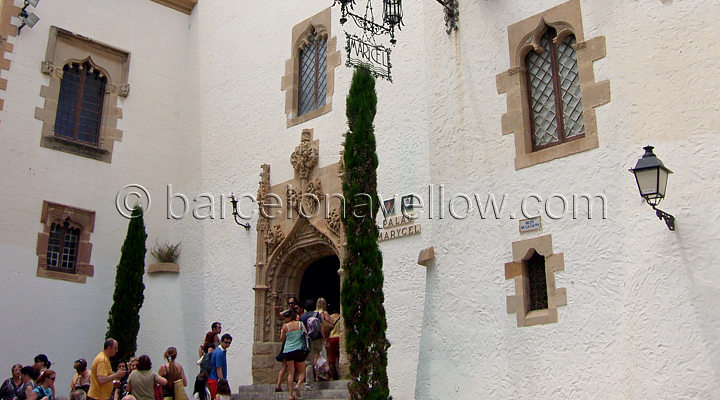 Streets in oldest part of Sitges which is called "casc antic de Sitges" 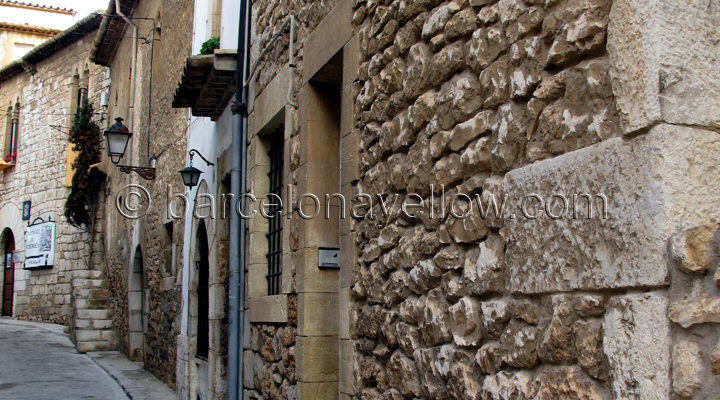 Sitges beaches in the spring with Sant Bartomeu i Santa Tecla church in background. Sitges has eleven beaches along the Passeig Maritim beach promenade. Sitges has 17 sand beaches in total. Four of them are to the east before you arrive in Sitges, eleven beaches in the town itself and two more further west. All the eastern and the village beaches services and blue flags awarded by the European Union for quality. 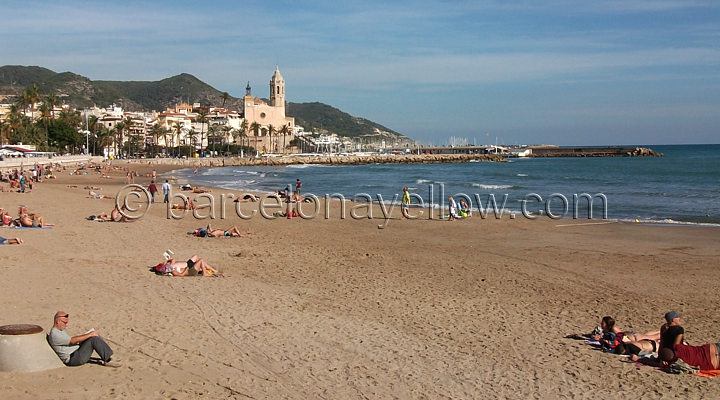 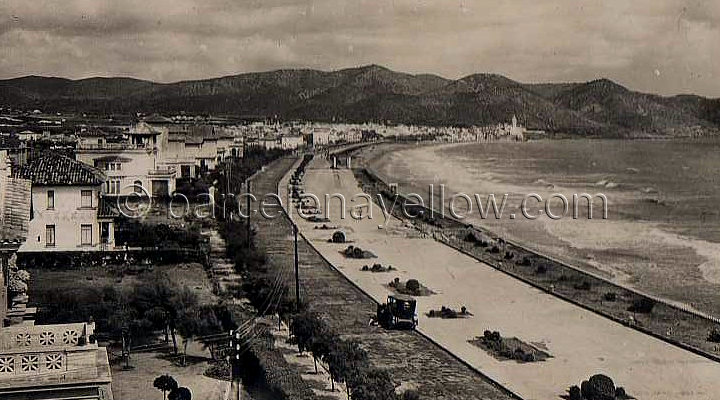 In the summer Sitges beaches have many facilities like beach bars, sun beds for rent and life guard services. Most beaches are mixed and open for all but Sitges is famed for being gay-friendly and has a large gay community. The principal gay beach in Barcelona is the "Platja de la Bassa Rodona" which is the third beach south of the church in front on the Calipolis Hotel and Picnic restaurant. 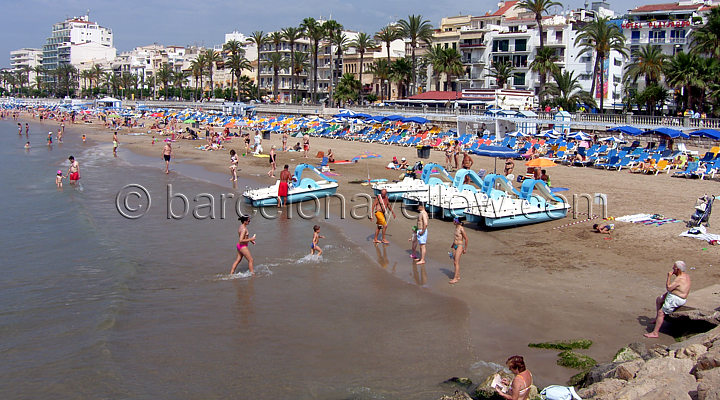 Breakwaters make beaches and bathing in Sitges safe and family friendly 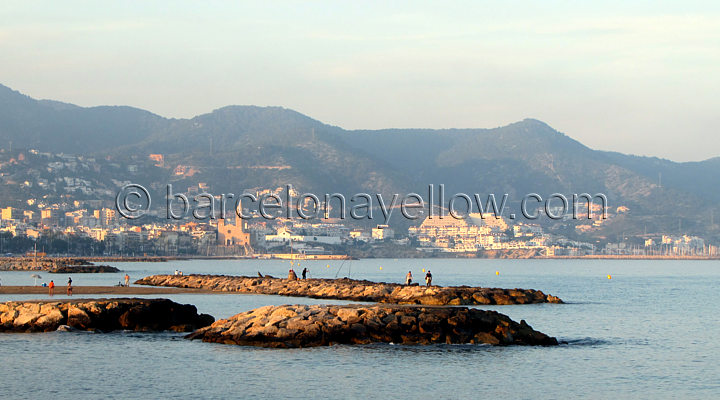 Sitges has many nice family friendly beaches stretching from the lovely Sant Bertomeu i Santa Tecla church all the way down to the last hotel on the beach promenade called the Sunway hotel. All Sitges beaches have clean sand and clean water. Sitges beaches have shallow water and are very safe for bathing. 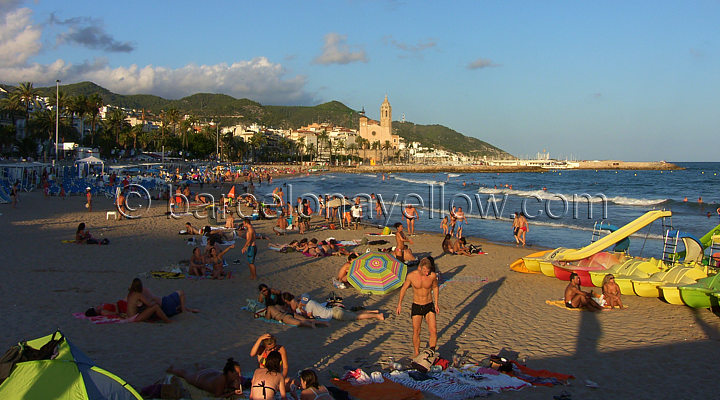 "Americanos" or "Indianos" houses still stand proudly on the beach promenade alongside more modern houses and apartment blocks. The modernist houses were built by rich Spaniards returning from the colonies like Mexico, Cuba and the Philippines with fortunes to spend on houses and businesses often in the modernist style of the times. 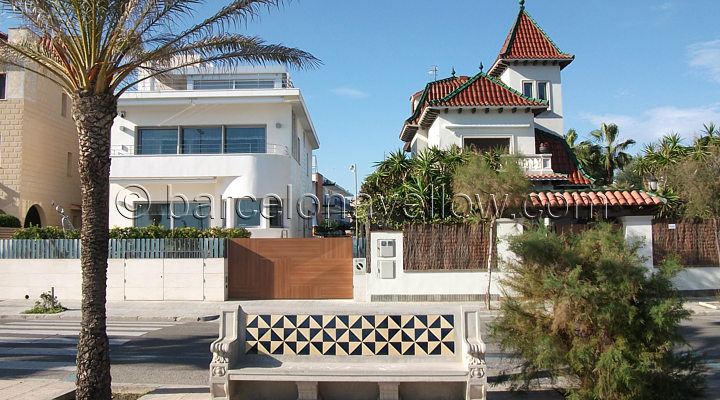 Charming narrow streets of Sitges. Sitges is lovely to walk around and many small shops are open all summer. 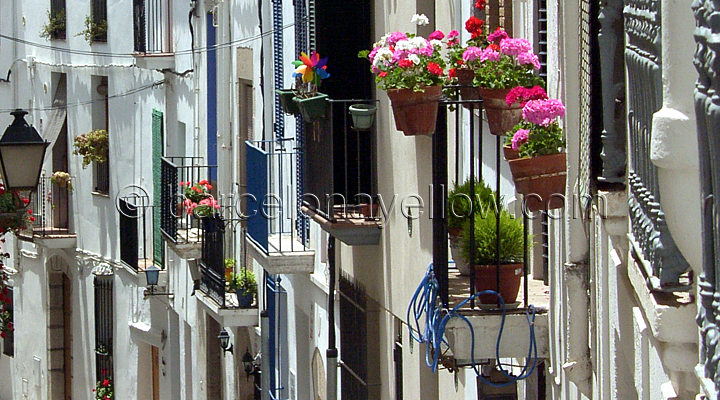 Passeig Marítim, Sitges is lovely for walks or any form of exercise. 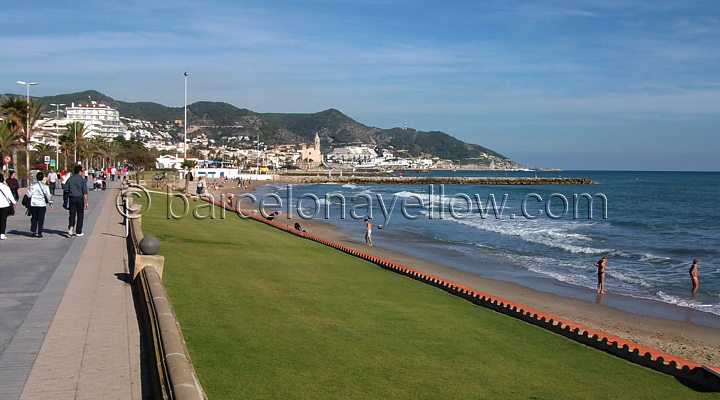 The oldest "chiringuito" beach bar in Sitges was built in 1913 before the breakwaters were built. The current beach promenade was built in the 1950s. 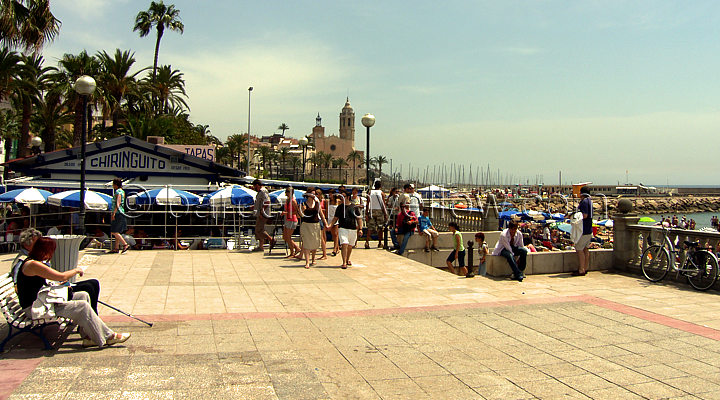 Views of Sitges sailing club called Club Náutico de Sitges on Playa Fregata 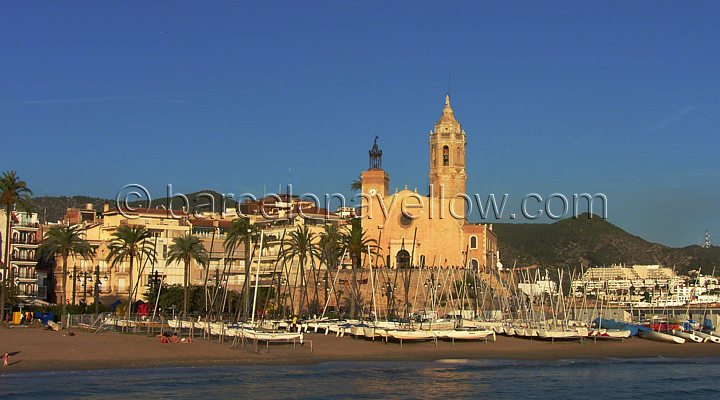 Waves pounding Sitges beaches in the winter. 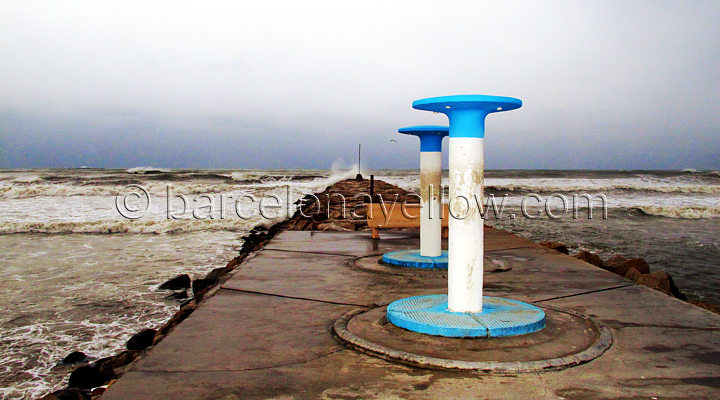 Town hall Sitges on La Punta hill, which is the highest point in Sitges village.The Sitges town hall was built in 1889 over the foundations of the old castle. 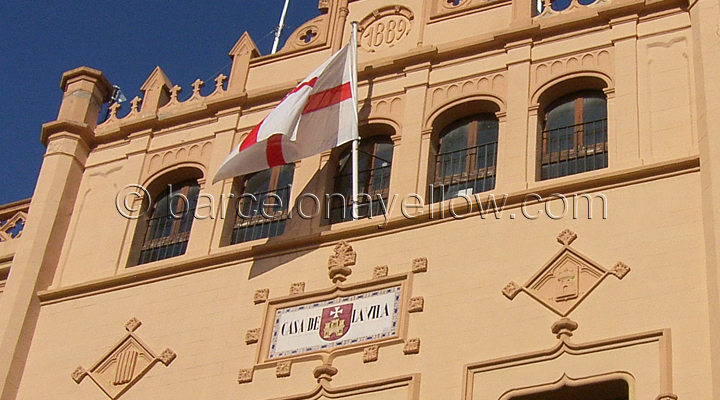 The Sitges flower carpet festival at Corpus Christi is a beautiful experience. Sitges covers its narrow streets and plazas with floral carpets with colourful designs. 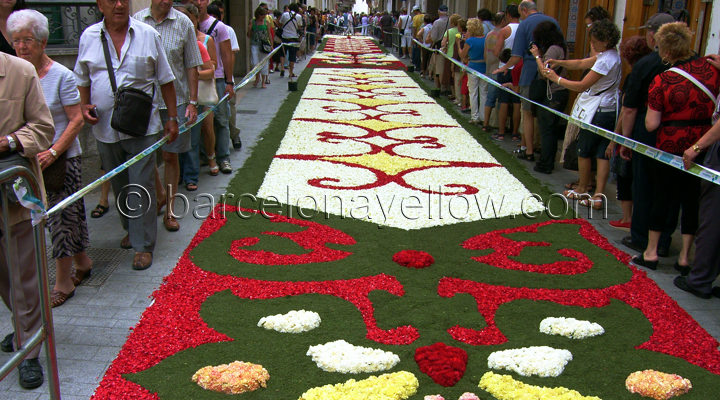 Sitges is a very romantic place to get married and you often see weddings. Sitges is also famous for its vibrant gay community 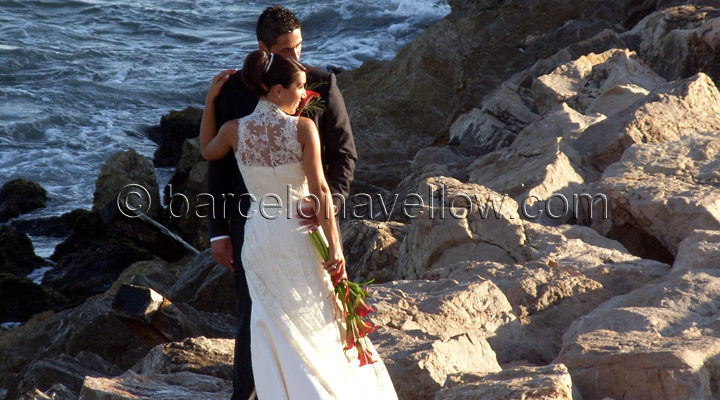 Beach train at Sitges called La Barqueta "Barca tren" turistica de Sitges. The train is called the boat train because the first trains had a boat pulling the carriages. See history of tourist boat train in Sitges 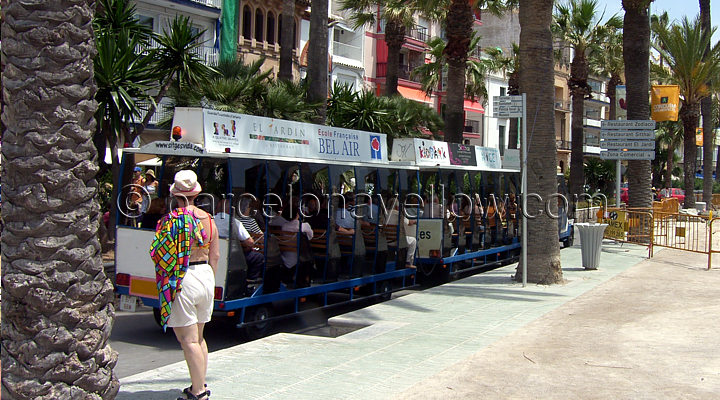 The old La Barqueta "Barca tren" turistica de Sitges in the sixties. 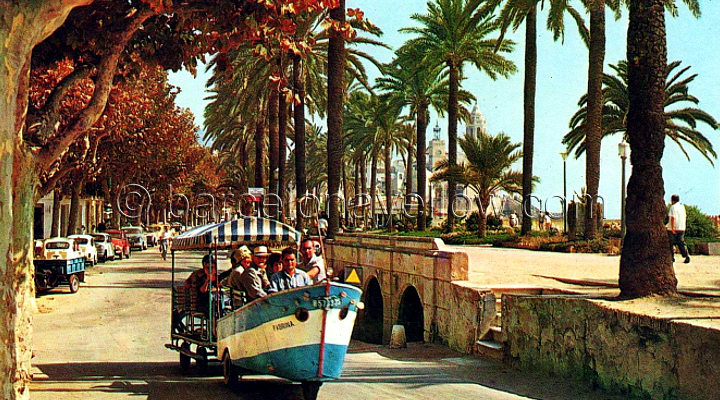 The Terramar Golf Club in Sitges at the southern end of the Passeig Maritim. Golf near Barcelona 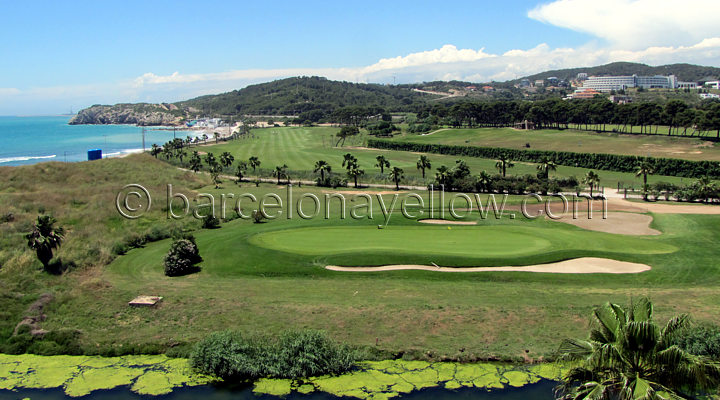 Ghostly racetrack in Sitges. There is an old abandoned banked racetrack in Sitges called the "Autodromo Sitges Terramar" which is still intact. It is in Sant Pere de Ribes very close to Sitges. This amazing racetrack was built in 1922 but abandoned after the first season in 1923. Some minor races were sporadically held on the circuit through the 1950s. Much of the track remains intact even after 80 years of disuse and it is sometime used for vintage exhibition races. French racing driver Albert Divo driving for Sunbeam won the first race staged on this track - and the only Spanish Grand Prix raced here. After this first race, the track was hit by financial difficulties and closed. It can be seen now, but is not officially open to the public. 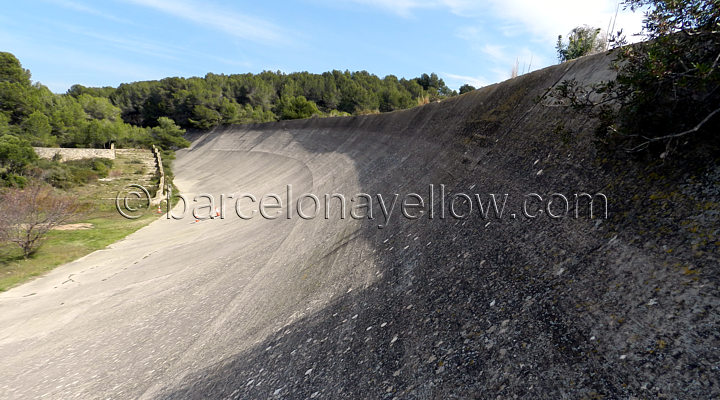 Sitges beach promenade Passeig de la Ribera which leads into Passeig Maritim 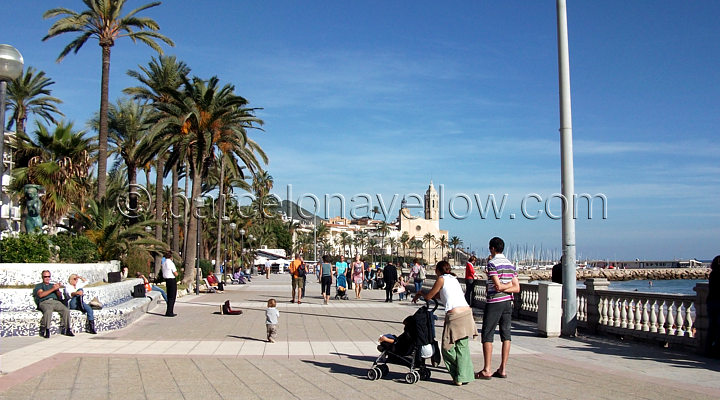 Masts at sunset at Sitges sailing club 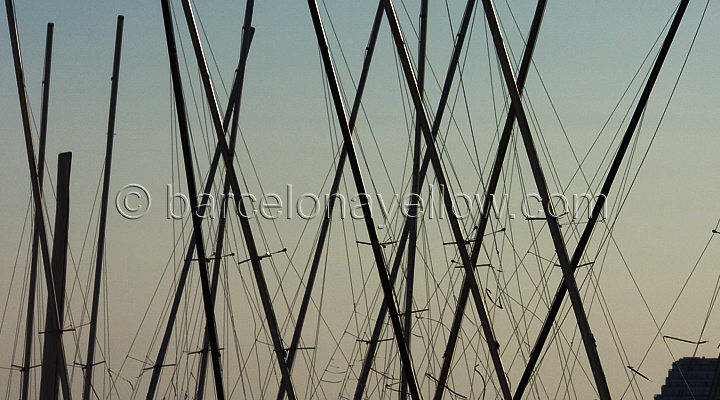 The famous Penedès wine region near Sitges. Visit Torres Winery which has an award winning visitors wine tour. 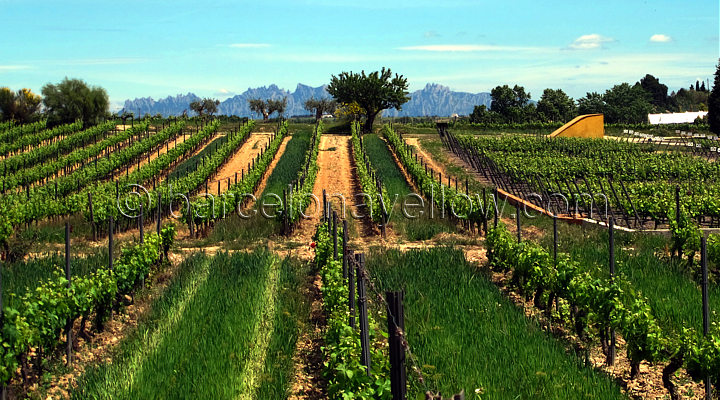 Open FULLSCREEN map hotels Sitges Sitges tourist information © Copyright Barcelonayellow.com. Do not copy from this page without permission All rights reserved |
| Last Updated on Wednesday, 05 January 2022 15:38 |
|
|
Friday, 04 July 2025

Barcelona Spain - Barcelona Travel Guide - Copyright 2007-2025
Privacy Policy and Cookies • Legal Disclaimer • Copyright
BarcelonaYellow SiteMap 2025
Barcelona Latest News:
COVID-19 - Barcelona Latest News
Barcelona Safety Guide 2025
Barcelona Top 10 attractions 20254
Plan 3 days in Barcelona 2025
About us
About us
Contact us
Privacy Policy and Cookies
Copyright notice
Legal disclaimer
Twitter Barcelona events
Partnerships
Advertising
COVID-19 - Barcelona Latest News
Barcelona Safety Guide 2025
Barcelona Top 10 attractions 20254
Plan 3 days in Barcelona 2025
About us
About us
Contact us
Privacy Policy and Cookies
Copyright notice
Legal disclaimer
Twitter Barcelona events
Partnerships
Advertising
Accommodation
Hotels in Barcelona
Hotels near Fira Exhibition
Hotels near Camp Nou
Hotels near Cruise Ships
Short Stay Apartments
Practical information
Useful visitor information
How to get to Barcelona airport
Cruise Ship Terminals
Barcelona maps
Airport buses
Barcelona metro
Taxis
Travel cards
Hotels in Barcelona
Hotels near Fira Exhibition
Hotels near Camp Nou
Hotels near Cruise Ships
Short Stay Apartments
Practical information
Useful visitor information
How to get to Barcelona airport
Cruise Ship Terminals
Barcelona maps
Airport buses
Barcelona metro
Taxis
Travel cards
Things to do
Top 10 attractions Barcelona
Photos of Barcelona
Restaurant Guide
Nightlife Guide
Things to do in Barcelona
Barcelona beaches
Book tours and tickets
Skiing near Barcelona
Weather Barcelona
Weather in Barcelona
5 day forecast Barcelona
Top 10 attractions Barcelona
Photos of Barcelona
Restaurant Guide
Nightlife Guide
Things to do in Barcelona
Barcelona beaches
Book tours and tickets
Skiing near Barcelona
Weather Barcelona
Weather in Barcelona
5 day forecast Barcelona
Top Festivals and events
Barcelona Events 2025
Christmas in Barcelona
New Years Eve 2025
MWC 2025 Barcelona
Sant Jordi's Day
Barcelona Marathon
Barcelona Half Marathon
Easter
Festa de Gracia
La Merce Festival
FC Barcelona calendar
Barcelona Events 2025
Christmas in Barcelona
New Years Eve 2025
MWC 2025 Barcelona
Sant Jordi's Day
Barcelona Marathon
Barcelona Half Marathon
Easter
Festa de Gracia
La Merce Festival
FC Barcelona calendar
Moving to Barcelona
Moving to Barcelona
Long term apartment rentals
Relocation agencies
Real estate agencies
Spanish schools
Meeting people
Finding work
Yellow pages directory
Partner websites:
DayTripsBarcelona.com
Stepbac.com
PhotoMemoirs.co
Helpfurl.com
Moving to Barcelona
Long term apartment rentals
Relocation agencies
Real estate agencies
Spanish schools
Meeting people
Finding work
Yellow pages directory
Partner websites:
DayTripsBarcelona.com
Stepbac.com
PhotoMemoirs.co
Helpfurl.com
